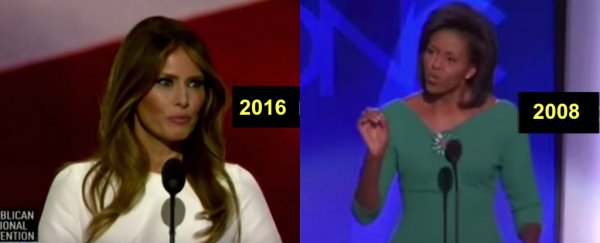A Canadian physicist has calculated that there's only a one-in-87-billion chance that Melania Trump wasn't heavily influenced by Michelle Obama's 2008 speech when she addressed the Republican National Convention last night.
Or to put that another way, Trump would have been about 7,000 times more likely to win the Canadian lottery than to accidentally put those phrases together in the same order as Obama did.
Robert (Bob) Rutledge, an associate professor of physics from McGill University in Montreal, took to Facebook this morning to share his calculations on the problem.
To start with, he isolated 14 distinct phrases that were used across both speeches - things like "word is your bond", "achievements", and "for what you want in life".
On their own, those are pretty common phrases, and it's not unlikely that both women would have chosen them in some way, shape, or form - or something similar to them - in both their speeches.
But the question Rutledge wanted to answer was: what are the chances that Melania Trump would randomly say them in exactly the same order as Michelle Obama chose to at the 2008 Democratic National Convention?
To figure that out, he calculated all the possible permutations of those phrases that exist - which basically involves taking each of the 14 phrases, and multiplying them by the 13 other phrases that could possibly come after them.
That gives you the number of options that exist for just two of the phrases to be spoken in the same order twice.
You then have to do the same for the third phrase, the fourth phrase, and so on.
When you write that out for all the common phrases, you get the formula: 14*13*12*11*10*9*8*7*6*5*4*3*2*1 - which represents all the possible orderings of the 14 common phrases in the two speeches.
"According to this calculation, there are a grand total of about 87 billion different permutations for those 14 distinct phrases," writes Rutledge over on Facebook. "That's 87,000,000,000 - or about the number of stars in the Milky Way Galaxy."
There are a few limitations of the study - Rutledge specifies that he's only using the text for the two speeches posted in this Vox article for his calculations.
His formula also doesn't take into account how many possible permutations of the phrases would actually make linguistic sense, or the probability of those phrases being placed next to each other in this type of political speech - which is an important thing to note, because if that was factored into the calculations, it would put the odds more in Trump's favour.
But, context aside, from a purely mathematical point of view, it's highly likely that Trump took at least part of her speech from Obama's.
You can see Rutledge's full post and calculations below:
And ICYMI, here's a side-by-side comparison of the two speeches:
